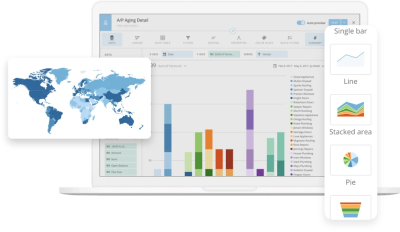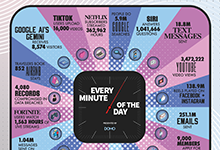The unexpected benefits of marketing analytics
Marketing analytics is the process of turning data into insights that help businesses make better decisions.
But did you know that marketing analytics can help businesses improve their customer relationships, better understand their customers, and even increase sales?
It’s true. In fact, BI tools allow businesses to do all of those things and more.
So, if you’re not already using marketing analytics in your business, now is the time to start. By harnessing the power of data, you can improve your marketing efforts in ways you never thought possible.
This article will take a closer look at the benefits of marketing analytics and how your business can get started.

What is marketing analytics?
In the business world, data is king. The ability to collect and analyze large amounts of data is becoming increasingly crucial for businesses of all sizes.
That’s where marketing analytics comes in. Marketing analytics is a process whereby businesses use data to improve their marketing efforts. By understanding what customers want and need, businesses can create targeted marketing campaigns that are more likely to lead to conversions.
How marketing analytics works
In order to understand how marketing analytics works, it’s important to first understand the concept of big data. Big data is a term used to describe the large and complex sets of data that businesses now have access to.
This data can come from a variety of sources, including social media, website traffic, sales records, and more. The trick is being able to sift through all of this data and find the nuggets of information that will be most helpful for your business.
For example, let’s say you own a clothing store. You might use marketing analytics to look at your sales data and determine which items are selling well and which ones are not.
You might also use social media data to see what customers say about your store and products. Based on this information, you can make changes to your marketing strategy to improve sales.
The bottom line is that marketing analytics allows businesses to make better decisions by understanding their data.
Now that we’ve answered the question, “what is marketing analytics,” let’s take a look at some of the benefits it can offer your business.
Benefits of marketing analytics
When companies implement marketing analytics, they often see a number of benefits. These benefits can include:
1. Helping businesses understand their customers better
2. Allowing businesses to make better decisions
3. Improving marketing efforts
4. Boosting sales
5. Helping businesses improve customer relationships
Let’s take a closer look at each of these benefits.
1. Helping businesses understand their customers better
Businesses that use marketing analytics understand their customers better. This is because the data collected by BI tools can be used to create customer profiles.
By understanding who their customers are, what they want, and what they need, businesses can create targeted marketing campaigns that are more likely to convert.

2. Allowing businesses to make better decisions
Marketing analytics allows businesses to make better decisions by understanding their data. This is because BI tools allow businesses to see patterns and trends in their data that would otherwise be difficult to see.
By understanding these patterns and trends, businesses can make more informed decisions about how to run their businesses. For example, a company might use marketing analytics to determine which products are selling well and which ones are not.
3. Improving marketing efforts
Marketing analytics helps businesses improve their marketing efforts by understanding what works and what doesn’t. For example, if a company sees that a particular advertising campaign is not resulting in any sales, it can stop running the campaign.
Alternatively, if a business sees that a particular product is selling well, it might decide to increase its advertising budget.
4. Boosted sales
Marketing analytics often leads to increased sales for businesses. This is because BI tools allow companies to target their customers more accurately.
By using BI tools, businesses can see what types of products or services their customers are interested in and create targeted campaigns specifically for those products or services. As a result, businesses see a higher conversion rate for those campaigns.
5. Helping businesses improve customer relationships
Marketing analytics also helps businesses improve their customer relationships by better understanding what customers want and need.
For example, if a customer leaves a negative review of a product on social media, a business using marketing analytics might reach out to that customer to ask for more information about the product they didn’t like. This type of customer service can go a long way in improving customer relationships.
What about the risks of marketing analytics?
As with any business decision, there are risks associated with marketing analytics. These risks can include:
1. The potential for data breaches
When businesses collect data using marketing analytics tools, there is a risk of data breaches. This is because, in order to collect data, businesses often need to share sensitive information such as customer passwords or credit card numbers.
If this information falls into the wrong hands, it can be used to steal identities or damage businesses financially. As a result, companies need to take steps to protect their data from being accessed by unauthorized individuals.
2. The potential for biased results
There is also the potential for marketing analytics to produce biased results. This can happen if the collected data does not represent the entire population.
For example, if a business only collects data from customers who live in a certain city, the results of their marketing analytics might be biased towards that city. As a result, it is important for businesses to make sure that the data they collect is representative of their entire customer base.

3. The potential for misuse
There is also the potential for businesses to misuse marketing analytics. For example, if a business uses marketing analytics to target ads at customers based on their personal information, this could be considered a form of invasion of privacy.
As a result, it is important for businesses to use marketing analytics in a way that does not violate the trust of their customers.
4. The potential for errors
Finally, there is the potential for errors in marketing analytics. This can happen if the collected data is inaccurate or if the analytics tools are not used correctly.
As a result, it is important for businesses to make sure that the data they collect is accurate and that their analytics tools are being used correctly.
How can businesses mitigate the risks of marketing analytics?
If your company is going to utilize marketing analytics, there are some steps you can take to mitigate the risks:
1. Use data encryption
Data encryption is one way to protect your data from being accessed by unauthorized individuals. This means that your data will be converted into a code that can only be decoded by authorized individuals.
2. Use data anonymization
Another way to protect your data is to use data anonymization. This means that your data will be stripped of any personally identifiable information.
3. Use data governance policies
Another way to mitigate the risks of marketing analytics is to use data governance policies. These policies can help ensure that your data is stored and analyzed in a way that is ethical and compliant with privacy laws.
4. Use data quality control measures
Finally, you can mitigate the risks of marketing analytics by using data quality control measures. This means that you will regularly check your data for accuracy and completeness.
By taking these steps, you can help to ensure that your data is protected and that your marketing analytics are accurate.
Check out some related resources:

Nucleus Research: Domo’s AI and Data Products Platform Returns $6.93 per Dollar Invested

8 Best AI Tools for Data Visualization






